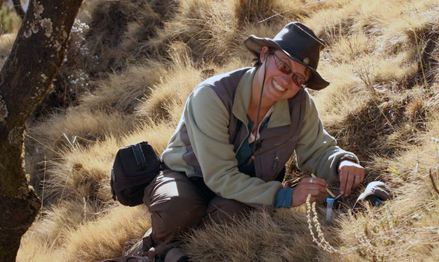Latest News Archive
Please select Category, Year, and then Month to display items
14 June 2024
|
Story Anthony Mthembu
|
Photo Suplied
 Jeremiah Hlahla, a UFS student completing his PhD in Botany at the University of Debrecen as part of an exchange initiative funded by the Erasmus+ Mobility Programme.
Jeremiah Hlahla, a UFS student completing his PhD in Botany at the University of Debrecen as part of an exchange initiative funded by the Erasmus+ Mobility Programme.
As part of an exchange initiative facilitated by the Erasmus+ Mobility Programme, Jeremiah Hlahla, a student at the University of the Free State (UFS), is nearing the completion of his PhD studies at the University of Debrecen in Hungary. Hlahla’s journey, which began in February 2024 and is set to conclude in July 2024, has been a remarkable learning opportunity. “As a first time-traveller to Europe, I have thoroughly enjoyed engaging with people from different countries and cultures,” he said.
The benefits of international collaboration
Hlahla is currently pursuing a PhD in Botany, focusing on plant stress physiology. “My current PhD project investigates the physiological, biochemical and morphological responses of vegetable-type soybean, or edamame, to combined drought and heat stress,’’ he explained. He considers the University of Debrecen the ideal institution to complete his research due to its extensive expertise and resources in similar projects. He noted that his colleagues at Debrecen conduct significant work on plant protection against biotic and abiotic stresses, including salt and drought stress, as well as proteins and amino acids in barley and other legumes.
Given the vast knowledge available on similar projects, Hlahla has found substantial engagement with his work at the University of Debrecen. “Upon arrival, I delivered an introductory lecture presenting my UFS project on the synergistic effects of combined drought and heat stress on the physiology and biochemistry of edamame. It was an engaging session as everyone could relate to my work and asked many questions,’’ he said.
Insights gained from the exchange
Hlahla has also gained valuable lessons that will assist him in his research career, including biotechnology and physiology tools. “I learned how to prepare samples and use high-performance liquid chromatography (HPLC) and reversed-phase ultra-high-performance liquid chromatography (UHPLC) to quantify proteins and amino acids,’’ he said. These techniques are beneficial not only for his current work but will also support future soybean research.
As his experience at the University of Debrecen nears its end, Hlahla reflects on the collaborations and friendships he has formed, which stand out as a significant highlight.
Vice-Chancellor’s Award for Excellence in Teaching goes to trailblazer Dr Aliza le Roux
2013-11-15
|
 |
Dr Aliza le Roux
Photo: Supplied
15 November 2013 |
Dr Aliza le Roux, Subject Head in the Department of Zoology and Entomology at the UFS Qwaqwa Campus, is this year’s winner of the Vice-Chancellor’s Award for Excellence in Teaching.
It came as no surprise. Dr le Roux has already been piling up numerous awards as a result of her outstanding work as an academic who is also an NRF-rated researcher.
In 2012, she joined the Teaching and Learning Champions group, which inspired her to take a more scholarly, research-focused approach to her teaching. Dr Le Roux has had huge successes in her teaching at the Qwaqwa Campus, propelling student pass rates from less than 50% to more than 90% in one course. As part of her approach, she makes use of interventions such as pre-class quizzes on Blackboard.
She is also doing Action Research on the teaching method known as ‘flipping’ the classroom, a process that essentially reversed traditional teaching practice. Dr le Roux is also looking into the impact of introducing Zotero (a free user-friendly online tool for research purposes) on the Qwaqwa Campus.
Her primary research outside of the classroom focuses on the evolution of wild mammals’ cognitive abilities. Dr le Roux and her students are starting fieldwork in November this year, investigating how paternal care impacts bat-eared foxes’ physical and cognitive development.